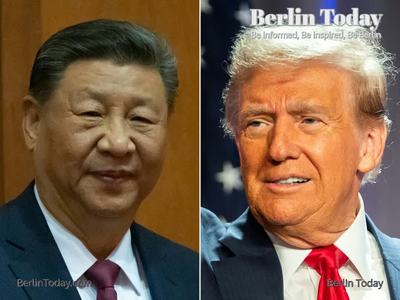
Eric Trump Provides Insights on Negotiating with Donald Trump Amid Trade Tensions
The son of former President Trump shares advice on dealing with his father's negotiating style as trade discussions intensify.
As trade negotiations continue to stir controversy in Washington, Eric Trump has offered insights into how to effectively negotiate with his father, former President Donald Trump.
In a post on social media, Eric Trump suggested that those negotiating with the U.S. administration should act quickly, asserting that "the first to negotiate will win, and the last will absolutely lose." This remark has drawn attention amid ongoing discussions regarding new tariffs and trade agreements, particularly with Canada and Mexico, where similar negotiations took place weeks earlier.
The U.S. has been actively considering the imposition of new tariffs, leading to speculation about the seriousness of the Trump administration's threats and whether they are part of a broader negotiation strategy.
Eric Trump's comments may reflect a strategy aimed at encouraging swift negotiations to secure favorable outcomes.
Ursula von der Leyen, President of the European Commission, has expressed a desire for both sides to engage in dialogue without delay, indicating that Brussels is keen to resolve concerns surrounding trade tariffs.
Following recent developments, U.S. Secretary of Commerce has also signaled a willingness to negotiate, further emphasizing the urgency of discussions in light of Eric Trump’s statements.
Currently, Eric Trump manages the Trump Organization, a business conglomerate founded by Donald Trump.
His comments come after a personal afternoon spent with his father at a golf course in Miami, where they attended an event related to the LIV Golf Tour.
Eric Trump, as the youngest son of Donald Trump, positions himself as an insider on matters concerning his father's negotiating tactics and approach to international trade.
The dialogue on tariffs reflects broader trade tensions faced by the U.S. in various global markets, and Eric Trump's advice may play into how both domestic and international partners respond to the fluctuating policies of the current administration.
In a post on social media, Eric Trump suggested that those negotiating with the U.S. administration should act quickly, asserting that "the first to negotiate will win, and the last will absolutely lose." This remark has drawn attention amid ongoing discussions regarding new tariffs and trade agreements, particularly with Canada and Mexico, where similar negotiations took place weeks earlier.
The U.S. has been actively considering the imposition of new tariffs, leading to speculation about the seriousness of the Trump administration's threats and whether they are part of a broader negotiation strategy.
Eric Trump's comments may reflect a strategy aimed at encouraging swift negotiations to secure favorable outcomes.
Ursula von der Leyen, President of the European Commission, has expressed a desire for both sides to engage in dialogue without delay, indicating that Brussels is keen to resolve concerns surrounding trade tariffs.
Following recent developments, U.S. Secretary of Commerce has also signaled a willingness to negotiate, further emphasizing the urgency of discussions in light of Eric Trump’s statements.
Currently, Eric Trump manages the Trump Organization, a business conglomerate founded by Donald Trump.
His comments come after a personal afternoon spent with his father at a golf course in Miami, where they attended an event related to the LIV Golf Tour.
Eric Trump, as the youngest son of Donald Trump, positions himself as an insider on matters concerning his father's negotiating tactics and approach to international trade.
The dialogue on tariffs reflects broader trade tensions faced by the U.S. in various global markets, and Eric Trump's advice may play into how both domestic and international partners respond to the fluctuating policies of the current administration.
Translation:
Translated by AI
AI Disclaimer: An advanced artificial intelligence (AI) system generated the content of this page on its own. This innovative technology conducts extensive research from a variety of reliable sources, performs rigorous fact-checking and verification, cleans up and balances biased or manipulated content, and presents a minimal factual summary that is just enough yet essential for you to function as an informed and educated citizen. Please keep in mind, however, that this system is an evolving technology, and as a result, the article may contain accidental inaccuracies or errors. We urge you to help us improve our site by reporting any inaccuracies you find using the "Contact Us" link at the bottom of this page. Your helpful feedback helps us improve our system and deliver more precise content. When you find an article of interest here, please look for the full and extensive coverage of this topic in traditional news sources, as they are written by professional journalists that we try to support, not replace. We appreciate your understanding and assistance.











